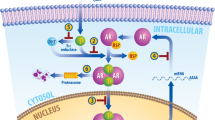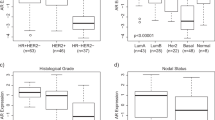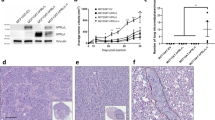Abstract
Little is known regarding the activity and function of the androgen receptor (AR) in human breast cancer. In the present study AR was evaluated in untreated primary breast cancers using antisera to the amino- and carboxy-termini of the receptor and quantitated using colour video image analysis. A strong correlation between tissue concentration and percentage AR-positive cells was observed for each antiserum. However, comparison of percentage positive cells using the amino- and carboxy-terminal AR antisera in individual breast cancer specimens revealed a subset of tumours with discordantly increased staining for the carboxy terminus. These findings suggest the presence of amino-terminal-truncated AR in a proportion of breast cancer cells or presence of AR mutations or associated protein alterations that affect binding of the amino-terminal AR antiserum. Immunohistochemical expression of the androgen-regulated glycoprotein, apolipoprotein D (apo-D), was also evaluated in the breast cancer specimens. Focal positivity of apo-D staining, which did not always co-localise with AR-positive cells, was observed within breast tumours. Furthermore, no correlation was evident between percentage positive cells stained for AR and apo-D in breast cancer specimens. These findings indicate that, although apo-D expression is androgen regulated in human breast cancer cell lines in vitro, its expression in primary breast cancers may be regulated by other factors. The expression of AR in primary breast cancers also suggests that the receptor may be involved in tumour responsiveness or in abnormal responses to endocrine therapies.
This is a preview of subscription content, access via your institution
Access options
Subscribe to this journal
Receive 24 print issues and online access
$259.00 per year
only $10.79 per issue
Buy this article
- Purchase on Springer Link
- Instant access to full article PDF
Prices may be subject to local taxes which are calculated during checkout
Similar content being viewed by others
Author information
Authors and Affiliations
Rights and permissions
About this article
Cite this article
Hall, R., Aspinall, J., Horsfall, D. et al. Expression of the androgen receptor and an androgen-responsive protein, apolipoprotein D, in human breast cancer. Br J Cancer 74, 1175–1180 (1996). https://doi.org/10.1038/bjc.1996.513
Issue Date:
DOI: https://doi.org/10.1038/bjc.1996.513
This article is cited by
-
Androgens Induce Invasiveness of Triple Negative Breast Cancer Cells Through AR/Src/PI3-K Complex Assembly
Scientific Reports (2019)
-
BRCA1 inhibits AR–mediated proliferation of breast cancer cells through the activation of SIRT1
Scientific Reports (2016)
-
Androgen receptors and serum testosterone levels identify different subsets of postmenopausal breast cancers
BMC Cancer (2012)
-
Androgen Resistance in Female Mice Increases Susceptibility to DMBA-Induced Mammary Tumors
Hormones and Cancer (2012)
-
Androgens in human breast carcinoma
Medical Molecular Morphology (2010)



